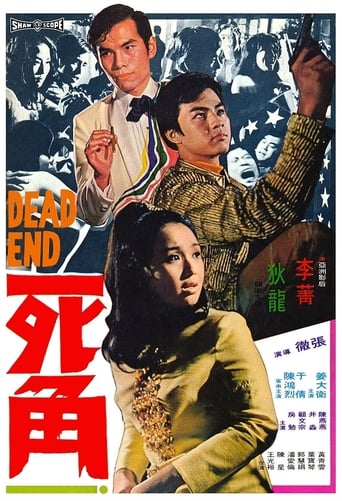Falconeer
"Dead End" is a stylish, atmospheric 'young rebel' type film starring a very young Ti Lung, and a young and beautiful Ching Lee. Very similar to "Rebel Without A Cause" in many ways, we find Ti Lung's character angry at the world and his situation, as he jumps from job to job, pissing off a lot of adults along the way. Until a chance encounter with the sheltered young heiress with the vicious and overprotective brother. Brother doesn't think that working man, Ti is good enough for his sister, and goes to extreme lengths to remove the man from their lives. This triggers an explosion of violence that culminates with some hand to hand fighting and a classic shootout in an abandoned junkyard. Much like the 1950's masterpiece starring James Dean, "Dead End" is shot in candy colors, and drenched with a sexy, moody jazz soundtrack. Female viewers will love Ti Lung in this one, and the romance, although predictable, is nicely done. The title is one of the rarest in the Shaw Bros library, as it is owned by a private collector, who refuses to release it to the Western market, and even the Asian DVD is long out of print. It took me over a year to locate a used VCD from Hong Kong, but it was worth tracking down. This is a dazzling piece of cult cinema, and features David Chiang in a supporting role. A must see for all fans of the genre.
Brian Camp
DEAD END (1969) offers a rather unusual attempt by director Chang Cheh and his two stars, Ti Lung and David Chiang, to craft a contemporary drama that has nothing in common with the martial arts spectacles this trio made for the Shaw Bros. studio throughout the 1970s (THE HEROIC ONES, DUEL OF THE IRON FIST, THE NEW ONE-ARMED SWORDSMAN, BLOOD BROTHERS, SHAOLIN TEMPLE, FIVE SHAOLIN MASTERS, etc.). Here Ti Lung plays Zhang Chun, a disaffected young ladies' man in Hong Kong (ca. 1968) who has difficulty holding down a job or showing any responsibility whatsoever, yet he thinks he's worthy of a rich girl, Wen Rou (Li Ching), whom he first meets when he comes to her aid after her Mercedes Benz has broken down on a highway. They embark on an unlikely romance, arousing the ire of her protective brother (Chen Hung Lieh), who proceeds to make life rough for Zhang, whose acquisition of a gun leads a to a predictable tragic turn of events.There's not much of a plot beyond that and the characters are never terribly interesting. Sure, Ti Lung displays a lot of charm as Zhang Chun, but the character is pretty shallow, as is the girl, Wen Rou. We never sense anything more substantial than a youthful fling between them, yet it's all treated highly melodramatically as if the two can't live without each other. Zhang makes love to two other women in the course of the film, yet he never even kisses Wen Rou. The most interesting character is an experienced bar girl named Mary, Ti's sometime girlfriend, who even lends him money for a date with Wen Rou. As expertly played by Angela Yu Chien, she's far more layered than any other character and the film would have benefited from more scenes with her. David Chiang plays David, Zhang's good buddy, whose old sports car Zhang borrows regularly to squire Wen Rou around. Ti is very handsome and dresses well in the film—he's even seen in a jacket and tie sitting at a desk and typing!—so female fans may enjoy this more than Ti's kung fu fans. David, on the other hand, isn't given much of a part, so fans of his will be better served by his swordplay epics.It's all done in a ponderous style, with long stretches of Zhang brooding by a phone booth and an interminable ballad sung on the soundtrack while Zhang makes love to a girl on his desk in his office at night (an antic that gets him jailed AND fired!). There's an attempt early on to imitate the freewheeling style of the French New Wave, but that loses steam as the corny across-the-class-divide romance kicks in. There are some awkward fight scenes, but they're either scuffles or beatdowns and don't involve any showy martial arts moves. It's all shot on a mix of studio sets and Hong Kong locations and is backed by a slow, jazzy score played by a small combo employing brass, woodwinds, guitar and percussion.There are some interesting American cultural references, including a quote from a Hemingway story and a radio interview where a Hong Kong actress is asked whom she prefers, Nixon or Humphrey. There are several mentions of James Dean and a bit at the end that either steals from or "pays tribute" to the ending of Dean's REBEL WITHOUT A CAUSE (1955). Dean's character in that film, Jim Stark, at least had good reason to be angry and showed some genuine feeling for other people, even those who antagonize him. Ti Lung's character, however, is just a petulant, spoiled child who has never grown up, so he never earns our sympathy.



